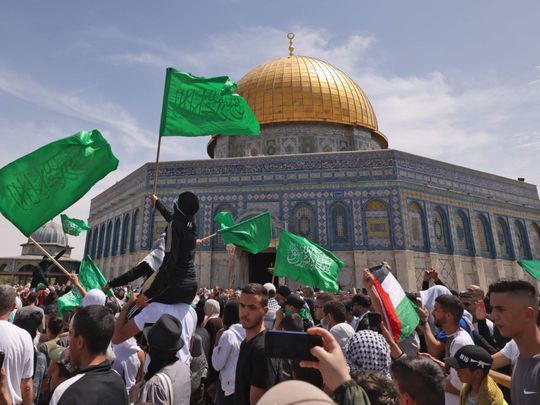
Washington: UN Secretary General Antonio Guterres discussed the ongoing flare-up of tensions around Jerusalem’s holy sites in separate calls Saturday with the Israeli prime minister and Palestinian president.
In statements released after both calls, the UN said Guterres discussed “efforts to lower tensions, end provocations and unilateral steps, and restore calm”.
More than 200 people, mostly Palestinians, have been wounded over the past week in clashes in and around the Al Aqsa compound, a holy site for both Muslims and Jews.
Palestinians have been outraged by a massive Israeli police deployment and repeated visits by Jews to the holy site, which is governed through a tenuous power-sharing agreement.
Guterres “reiterated that the status quo at the Holy Sites must be upheld and respected,” both statements read.
The clashes at Al Aqsa come amid a wave of deadly violence, which has sparked fears of a wider conflict.
Rocket launches from the Gaza Strip on Wednesday and Thursday prompted retaliatory strikes from Israel.
But after similar attacks from Gaza on Friday night and Saturday morning, Israel decided not to launch counterattacks, instead saying it would close its only border to the enclave on Sunday.
The Palestinians denounced the move as “collective punishment” of the impoverished territory’s 2 million residents, who have lived under an Israeli-Egyptian blockade since Hamas seized power from rival Palestinian forces nearly 15 years ago.
The Israeli military body that coordinates civilian affairs in Gaza said the crossing used by workers would not be re-opened on Sunday, the start of the work week. “The re-opening of the crossing will be decided accordingly with a security assessment,” it said in a statement.
In recent months, Israel had issued thousands of work permits to Palestinians from Gaza.
Israel portrayed the move as a goodwill gesture in order to maintain calm, but the permits - which can be revoked at any time - also give it a strong form of leverage over Palestinians. Israel grants permits to some 12,000 Palestinians in Gaza and over 100,000 to Palestinians in the occupied West Bank, mostly for work in construction and other menial jobs.
The Gaza workers union said the closure was “collective punishment” and would hurt the already suffering economy, where unemployment hovers around 50 per cent. It said the timing of the closure, just before the Eid Al Fitr holiday marking the end of the holy month of Ramadan, would compound the pain for families struggling to make ends meet.
Sami Amassi, the head of the union, said the permits themselves were meant to “exploit” the workers for political purposes, rather than improve their lives.












